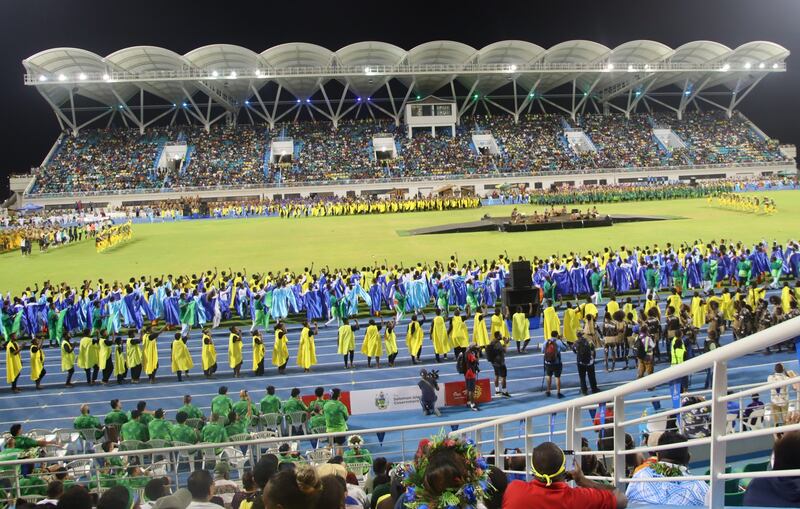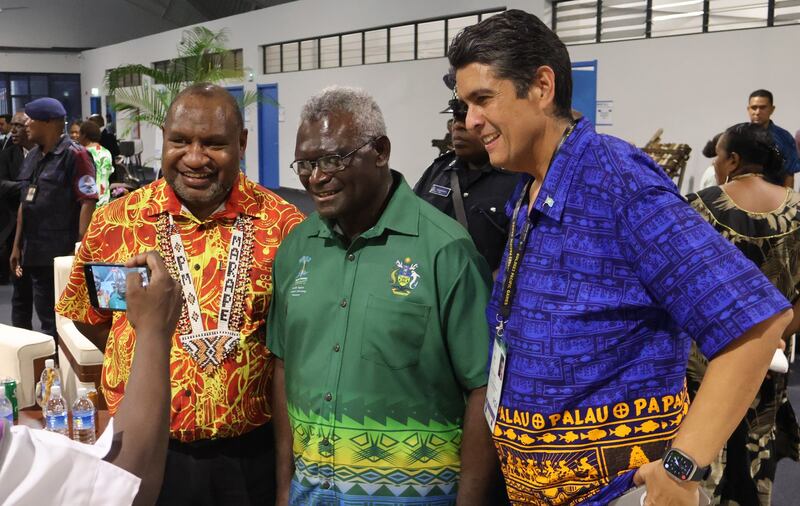The Solomon Islands capital Honiara is buzzing with sporting fervor and patriotic pride as the island country that was rocked by riots two years ago hosts several thousand competitors from Pacific island nations for the region’s largest sporting event.
The 17th Pacific Games brings together athletes from 24 Pacific island nations and is taking place across a slew of new sports venues in Honiara that were funded and built by countries such as China, Australia and Indonesia and the Solomon Islands government.
The host nation is aiming to win 40 gold medals at the 2023 games, which would be a record haul for the country. Its first five gold medals of the games were won Monday by weightlifters – national team flag bearer Jenlyn Wini in the women’s 55 kg division and Brown Chester Ramohaka in the 61 kg division.
“It’s a wow for me, the biggest event ever hosted in Solomon Islands after 45 years of independence, everything came together,” said Solomon Islander Mike Wate after witnessing the opening ceremony.
Honiara's hosting of the Pacific Games has not been without its domestic critics, who have questioned the wisdom of spending taxpayer money on the event, but now it is underway, it is fostering unity and pride among Solomon Islanders and strengthening ties between Pacific island peoples and governments, officials say.

The organizing committee said some 10,000 people attended the opening ceremony, filling the main stadium to capacity and welcoming national sporting teams with standing ovations. Local community groups cleaned up the stadium afterwards, the committee said, part of a workforce of 80 community organizations that will provide cleaning and waste disposal for all venues during the two weeks of competition.
“I’m really excited because this is a once in a lifetime event and I’m really happy I got the chance to witness it,” said 21-year-old Patteson Otini.
At a one-year-to-go event in November last year, National Hosting Authority Chairman Jimmie Rogers bemoaned how neighboring countries with populations of little more than 10,000 people had outcompeted the Solomon Islands – the third most populous Pacific island nation – in past games.
The Solomons brought home four golds from the 2019 Pacific Games and frequently none at earlier games, which have been held every four years since the early 1960s.
The archipelago about 2,100 kilometers (1,300 miles) northeast of Brisbane, Australia, has struggled with crumbling roads, limited telecommunications and lack of basic healthcare.

Solomon Islands Prime Minister Mannaseh Sogavare said preparing for the Games has been “the experience of a lifetime” and helped to unite the country.
Honiara’s Chinatown was destroyed by anti-China and anti-government rioting in November 2021 that followed Sogavare’s decision in 2019 to switch diplomatic recognition to Beijing from Taiwan.
The infrastructure and sports facilities built for the Games such as a stadium, aquatic center and other venues will “leave incredible legacies that will serve future generations of Solomon Islanders,” Sogavare said in a statement.
China has contributed half of the games’ approximate 1.85 billion Solomon Island dollars (U.S. $220 million) cost and the Solomon Islands government nearly one third. Australia, Japan and Indonesia also have made significant contributions.
Australia along with the Solomon Islands police and Papua New Guinea are providing security during the events.
BenarNews is an online news outlet affiliated with Radio Free Asia.
